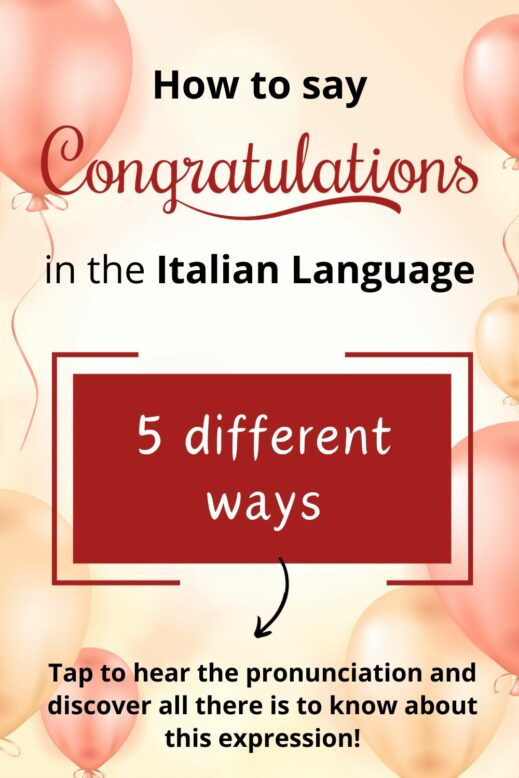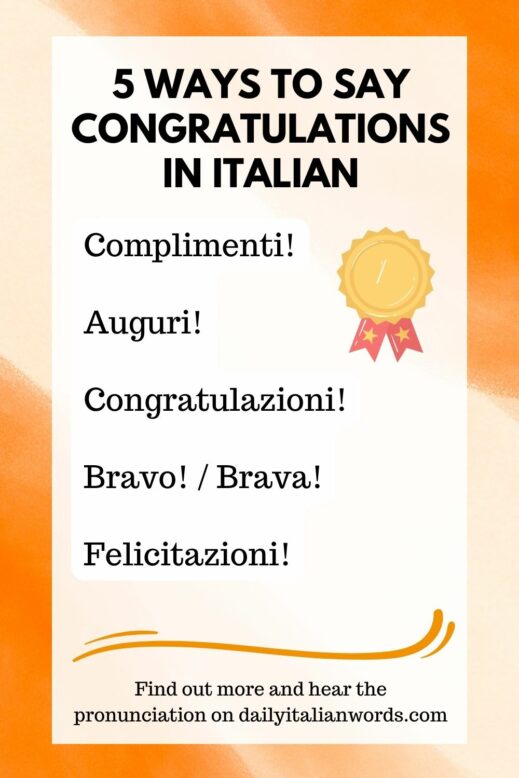If you are looking for a way to congratulate someone, such as a friend, family member or colleague, on an important life event or a significant achievement, look no further: here you’ll find five possible translations for the expression “Congratulations!” in Italian!

1. Congratulazioni!
Let’s begin with the expression that most closely resembles the English equivalent.
Congratulazioni is a formal expression in Italian, normally addressed to those directly involved in a one-off celebration that is personal in nature, such as a wedding, engagement, birth of a child, graduation ceremony, and so on. It is a feminine noun (congratulazione), but it’s almost always used in its plural form.
Congratulazioni per il vostro matrimonio! Siamo veramente felici per voi!
Congratulations on your wedding! We’re truly happy for you!
Italians also use Congratulazioni! to praise someone on an achievement or excellent result, such as a promotion or the completion of a successful project.
Congratulazioni per la promozione! Te la meriti!
Congratulations on the promotion! You deserve it!
Note that unlike the English expression, Congratulazioni! occurs far more often in writing than in speech, so it shouldn’t be your go-to translation. To discover some more appropriate expressions, keep on reading!

2. Auguri!
Another expression with which I am sure most of you are familiar is Auguri! which literally translates as Best wishes! It is a masculine noun and the singular augurio means wish or greeting.
WhereasCongratulazioni! is said during or after apersonal “one-off” celebration, Auguri! tends to be saidbefore the occurrence of the event.For example, if your sister tells you she is getting married next spring, you would use auguri instead of congratulazioni because the event hasn’t happened yet.
Io e Sabrina ci sposeremo a maggio! – Caspita, ma che bella notizia! Auguri!
Sabrina and I are getting married in May! – Wow, what wonderful news. Congratulations!
In all other situations, Auguri! is a catch-all greeting, used at recurring events in the place of or in conjunction with greetings such as Buon compleanno! (Happy birthday!), Buon Natale! (Merry Christmas!), Buona Pasqua! (Happy Easter!) and so on.
Oggi compio 25 anni. – Auguri!
Today, I’m turning 25! – Happy birthday!
Some popular variations on Auguri! include:
- Tanti auguri! = lit: Many best wishes!
- Auguroni! = lit: Big best wishes!

3. Complimenti!
Of all the expressions listed here, Complimenti! is probably the closest in nature to Congratulations! in terms of its versatility and formality. It is a masculine noun (complimento, meaning compliment) but, in this context, it is always used in its plural form.
You can use it, not only to congratulate someone on an important life event, but also an achievement, no matter how great or small. It also conveys a sense of warm admiration or appreciation for the other person.
Complimenti per la tua laurea, Sofia!
Congratulations on your graduation, Sofia!
Complimenti per il lavoro svolto!
Congratulations on a job well done!
Like the English equivalent, it occurs both in speech and writing.
Keep in mind that you will also see it translated as Good job! / Well done! when your admiration or appreciation is directed at a smaller achievement.
Papà, ho finito il mio disegno! – Wow, complimenti. È bellissimo!
Dad, I’ve finished my drawing! – Wow, good job! It’s lovely!
Complimenti differs from congratulations in that it can also be used to compliment a person’s appearance, abilities, possessions, family members, and so on – not just their life events or achievements.
Che bel vestito– complimenti per il tuo stile!
What a lovely dress– you have quite the style!
(lit: Congratulations on your style!)

4. Bravo! / Brava!
In informal situations, it is usually sufficient to use the well-known expressions Bravo! (for a male) and Brava! (for a female) to congratulate someone on a job well done, much like the friendly abbreviation Congrats!
Ho superato l’esame! – Bravo! Ero sicuro che ce l’avresti fatta!
I passed the exam! – Congrats! I was sure you’d manage it!
Bravi ragazzi, avete giocato davvero una bella partita!
Congrats guys, you really played a good match!

5. Felicitazioni!
Moving into truly formal territory, we have the expression Felicitazioni! which is the equivalent of Felicitations! in English. It is a feminine noun (felicitazione) and is almost always used in its plural form.
Like Congratulazioni!, this expression tends to be restricted to writing, namely letters and greeting cards.
Le nostre vivissime felicitazioni per il lieto evento!
Our heartfelt congratulations on the happy event!



Heather Broster is a graduate with honours in linguistics from the University of Western Ontario. She is an aspiring polyglot, proficient in English and Italian, as well as Japanese, Welsh, and French to varying degrees of fluency. Originally from Toronto, Heather has resided in various countries, notably Italy for a period of six years. Her primary focus lies in the fields of language acquisition, education, and bilingual instruction.


